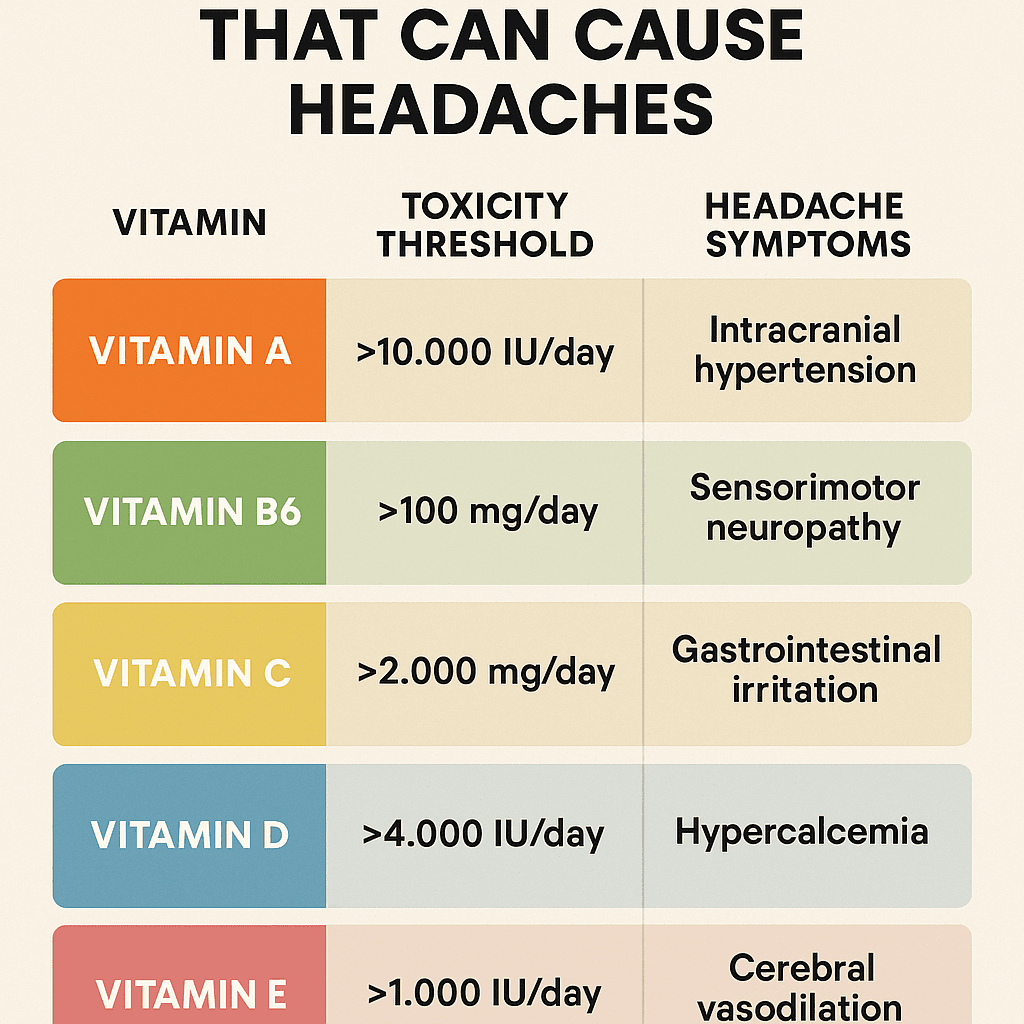Which Vitamins Can Trigger Headaches? [Quick Answer]
Some vitamins can cause headaches when consumed in excessive or deficient amounts. Here’s a summary of the most common culprits:
| Vitamin | Cause | Headache Mechanism |
|---|---|---|
| Vitamin A | Excess (>10,000 IU/day) | Intracranial pressure, pseudotumor cerebri |
| Vitamin B6 | Excess (>100 mg/day) | Neurotoxicity, tension-type headaches |
| Vitamin B12 | Deficiency | Mitochondrial dysfunction, increased migraines |
| Vitamin B2 | Deficiency | Reduced brain energy metabolism, migraine risk |
| Vitamin C | Excess (>2,000 mg/day) | GI irritation, pro-oxidant in iron overload |
| Vitamin D | Both excess and deficit | Inflammation, vasoconstriction, CGRP modulation |
| Vitamin E | Excess (>1,000 IU/day) | Microbleeds, vasodilation-related migraines |
Always monitor supplement doses and speak to a healthcare provider before making changes.
Introduction
Can your vitamins be causing your headaches? While some nutrients help prevent migraines, others, when over- or under-consumed, can trigger them. This guide breaks down the list of vitamins that can cause headaches, explains how they influence brain function, and provides clinical insights for safer supplementation.
Understanding the balance between nutrient benefit and toxicity is essential for anyone experiencing unexplained or chronic headaches.
Headache Risk Calculator: Are Your Supplements a Trigger?
If you’re unsure whether your daily supplements might be contributing to your headaches, this calculator can help. Simply enter your typical vitamin doses, and the tool will flag any levels known to be associated with headache onset.
It’s an easy way to evaluate risk before your next refill.
Headache Risk from Vitamin Intake
This tool provides educational guidance. Always consult a healthcare provider for medical advice.
Vitamin A: Too Much of a Good Thing
Vitamin A toxicity (hypervitaminosis A) occurs when preformed retinol builds up in the body, especially from supplements or liver-rich diets. High levels increase intracranial pressure, mimicking conditions like pseudotumor cerebri.
Symptoms and Research:
- Doses above 25,000 IU can lead to throbbing headaches, vertigo, and nausea within hours.
- Chronic intake over 10,000 IU/day has been linked to persistent migraine-like symptoms, according to Medical News Today and StatPearls.
Clinicians advise caution with liver supplements and cod liver oil. Monitor vitamin A intake, particularly in children or patients on long-term multivitamins. Review all your supplements and their potential interactions to avoid popular bed symbiotics.

Vitamin B6: A Surprising Source of Neurotoxicity
Though vital for neurotransmitter function, excessive B6 (especially pyridoxine) may become neurotoxic. It interferes with active B6 (P5P), leading to sensorimotor symptoms.
Headache Links:
- A 2017 study noted that more than half of patients taking over 200 mg/day developed tension-type headaches.
- Symptoms like burning, tingling, and headaches may appear weeks before full neuropathy develops.
B6 is often marketed for PMS and nerve pain. Doses over 50 mg/day should be supervised by a clinician. Learn more on Consensus Academic Search.
B12 and B2: When Deficiency Fuels the Pain
B12 Deficiency
Vitamin B12 deficiency impairs myelin formation and energy production, increasing inflammation in pain pathways.
- Research in 2024 connected B12 levels below 200 pg/mL to increased migraine frequency.
- Elevated homocysteine and oxidative stress contribute to nerve sensitization.
B2 (Riboflavin) Deficiency
Essential for mitochondrial energy, low riboflavin disrupts brainstem function.
- According to WebMD and PMC studies, low B2 levels increase migraine vulnerability.
- Supplementation (400 mg/day) has been shown to cut migraine days by half in deficient patients.
Vitamin C: Dose Matters
Vitamin C’s antioxidant benefits are well-known, but too much can backfire.
Causes of Vitamin C-Related Headaches
- High-dose supplements (>2,000 mg/day) can irritate the GI tract and trigger tension-type headaches.
- In iron-overloaded individuals, vitamin C can produce free radicals that stimulate migraines.
Interestingly, intravenous vitamin C (500–1,000 mg) may help relieve post-dural puncture headaches, illustrating its dual role depending on route and dosage.
For more on C’s side effects, see Mayo Clinic and Healthline guides.
Vitamin D: Deficiency and Toxicity Effects
Low Vitamin D
Deficiency (<20 ng/mL) is common, particularly in winter months. It elevates inflammatory markers and sensitizes pain receptors.
- Multiple meta-analyses link deficiency to increased migraine risk.
- Daily supplements (1,000–4,000 IU) reduce CGRP levels and help manage chronic headache disorders.
High Vitamin D
Taking >50,000 IU daily can lead to hypercalcemia, a known cause of thunderclap headaches.
- Advance Headache Center reports that symptoms resolve with hydration and steroids.
- Blood levels should remain below 150 ng/mL.
Vitamin E: Risk of Microbleeds and Vasodilation
Vitamin E, in doses over 1,000 IU/day, can thin blood by interfering with vitamin K. It increases risk of subtle brain microbleeds and vasodilation.
- A 2024 study linked chronic headaches in 22% of high-dose vitamin E users.
- Tocopherols may also enhance nitric oxide production, leading to vascular migraines.
See MSD Manuals and Clinikally.com for safety guidelines.
Conclusion

The list of vitamins that can cause headaches includes both essential and supplemental nutrients. Headache onset can stem from either toxicity (vitamins A, B6, C, D, E) or deficiency (B2, B12, D).
Key Takeaways:
- Track your supplement intake and review all active ingredients.
- Consult a healthcare provider before using high-dose B6, vitamin D, or vitamin A.
- Address any deficiencies in B2, B12, or vitamin D if headaches are persistent.
- Be mindful of vitamin stacking from fortified foods and multivitamins.
For broader guidance, check our articles on vitamins and supplements interactions.
